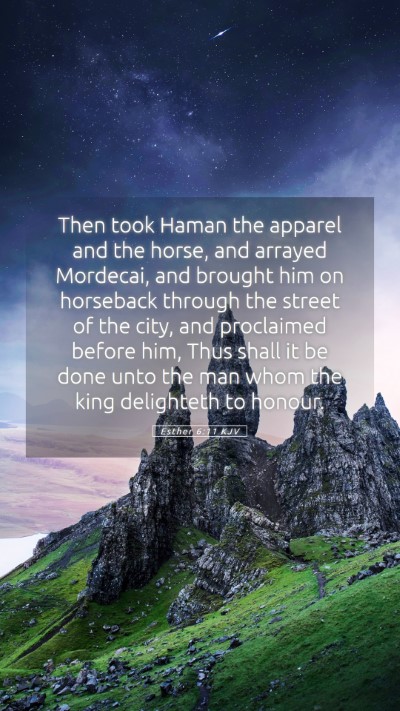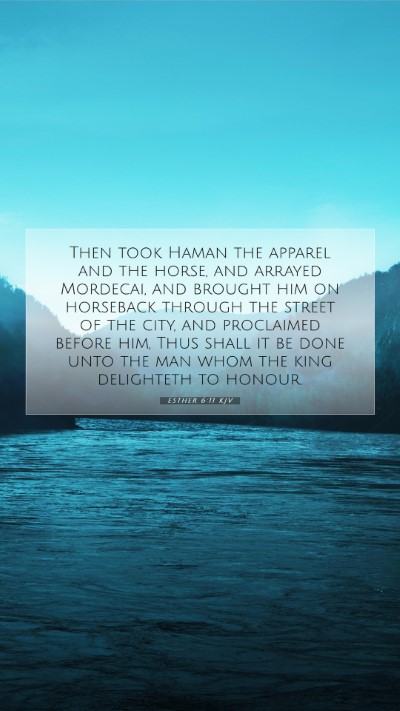Old Testament
Genesis Exodus Leviticus Numbers Deuteronomy Joshua Judges Ruth 1 Samuel 2 Samuel 1 Kings 2 Kings 1 Chronicles 2 Chronicles Ezra Nehemiah Esther Job Psalms Proverbs Ecclesiastes Song of Solomon Isaiah Jeremiah Lamentations Ezekiel Daniel Hosea Joel Amos Obadiah Jonah Micah Nahum Habakkuk Zephaniah Haggai Zechariah MalachiEsther 6:11 Meaning
What is the meaning of Esther 6:11?
Then took Haman the apparel and the horse, and arrayed Mordecai, and brought him on horseback through the street of the city, and proclaimed before him, Thus shall it be done unto the man whom the king delighteth to honour.
Esther 6:11 Bible Verse Meaning
Understanding Esther 6:11
Esther 6:11 states: "So Haman took the garment and the horse and arrayed Mordecai, and brought him on horseback through the street of the city, and proclaimed before him, Thus shall it be done unto the man whom the king delighteth to honor."
Bible Verse Meanings
This verse captures an ironic twist, as Haman, who seeks to destroy Mordecai, is forced to honor him. The action of parading Mordecai through the streets signifies public recognition and honor.
Insights from Commentary
- Matthew Henry: Henry explains how the providence of God turns Haman’s wicked intentions into a vehicle for Mordecai's exaltation. This illustrates divine justice, where the proud are brought low, and the humble are lifted.
- Albert Barnes: Barnes comments on the significance of public honor and how it serves as a dramatic foreshadowing of cultural reversals. Haman's missteps highlight his hubris and the dangers of pride.
- Adam Clarke: Clarke notes the importance of the horse, a symbol of royal authority, emphasizing that the honor bestowed upon Mordecai reaffirms God’s ultimate authority over earthly rulers.
Bible Verse Interpretations
This verse can be interpreted as a powerful statement about fate and moral justice. Haman’s plan backfires, showcasing how the Lord intervenes on behalf of the faithful. It invites readers to reflect on the nature of honor and the risks of ambition.
Symbolism in Haman's Actions
- Divine Retribution: Haman’s forced adoration of Mordecai symbolizes the turning of tables, where the oppressor becomes the servant.
- Public Shame: The public nature of the honor illustrates the concept that pride leads to downfall, resonating with Proverbs 16:18.
Understanding the Context
The context surrounding Esther 6:11 helps in grasping its significance. At this point in the narrative, Haman had plotted to kill Mordecai; however, God’s providence aligns events so that Haman ends up honoring Mordecai, solidifying the theme of divine irony.
Historical Analysis
Understanding the historical setting of Esther’s reign and the Persian Empire provides clarity on the seriousness of Haman’s actions and the ultimate vindication of Mordecai. During this time, the king’s favor was paramount, and being honored publicly was a significant event—such honor could lead to powerful alliances and elevation in status.
Application of the Verse
Esther 6:11 serves as a reminder of humility and dependence on God’s plan. When faced with adversity or injustice, believers are encouraged to remain faithful and trust that God sees their struggle and will act in due time.
Modern-Day Implications
- Faith in Adversity: This verse encourages individuals to hold onto their faith during trials, reminding them that God can turn bad situations into opportunities for glory.
- Caution Against Pride: Haman’s downfall warns against the dangers of pride and the importance of humility.
Bible Cross References
- Proverbs 16:18 - "Pride goes before destruction, and a haughty spirit before a fall."
- James 4:10 - "Humble yourselves before the Lord, and he will exalt you."
- Psalm 37:24 - "Though he fall, he shall not be cast headlong, for the Lord upholds his hand."
Conclusion
In conclusion, Esther 6:11 not only conveys a moment of dramatic irony but also serves as an essential lesson on humility, divine justice, and the power of God's providence in the lives of His faithful servants. As readers analyze this scripture, they gain insight into the broader themes of the Book of Esther and the continued relevance of its messages today.


